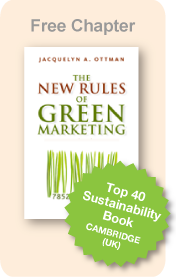Jacquie Ottman's
Green Marketing Blog
How To Make Waste Watching Fun, Easy — and Mainstream
April 15, 2013 by Guest Blogger, Fredrica Rudell

With 9 billion people expected on the planet by 2025, all consumers will need to be reducing, refusing, repairing, reusing, recycling, and lots of other R’s. If your consumers are not on board the waste prevention movement, take some advice from social marketers — make it easy, fun and popular. Here’s how.
Easy Does It
Curbside pickup and reverse vending machines at the supermarket make it easy to recycle newspaper and co-mingles and redeem deposit bottles and cans. Businesses and schools that provide clear instructions and accessible recycling bins can help boost compliance, too. And the Internet abounds with helpful information and advice. This is one of the most comprehensive lists of Eco Tips I’ve seen.
What can brands do to make it easier and more convenient for consumers to reduce waste? Streamlined packaging, concentrates, and recycled paper towels with “select-a-size” options help. Refillable products are great, but only if the refills are economical, uniform, and widely available. When was the last time you replaced the refill in a pen that ran out of ink? Or even saw pen refills at a store?
Through their Common Threads program, Patagonia has been promoting responsible consumption and recycling of their outerwear for years. Now clothing stores like Marks & Spencer and H&M
are making it convenient to drop off unwanted clothing and “schwop” for new duds on the same trip. Eileen Fisher has closed the loop by setting up “Green Eileen” outlets for selling their used clothing.
WasteHaters Just Wanna Have Fun
Some of us derive pleasure from the sheer challenge of reducing as much waste as possible and forming new habits (like remembering to bring cloth shopping bags to the store). Just as many companies are re-designing and re-imagining products and services, and bringing exciting “eco-innovations” to market, green consumers are finding a new creative outlet by figuring out inventive ways to use less (energy, water, products…) and repurpose items that would otherwise be discarded. The new WeHateToWaste website has numerous examples, from People Towels to recipes for leftovers, to making fashionable furniture from old shutters. One of my students found this great collection of creative re-uses.
“Gamification”, or application of game-like activities, feedback and rewards can also nudge people towards waste-reducing behavior while they’re having fun. Examples include Recyclebank and The Fun Theory.
One game designer who believes in the power of play has created a card game (aptly named “Waste Not”) to help unleash our creativity in “rethinking” uses for common objects that may otherwise end up in the trash.
And who can resist the sheer fun of Mr. Eco, as this super hero raps his way into our hearts with messages about recycling, water conservation, and food waste reduction.
What will it take to make Waste Hating popular?
Despite the obvious environmental, economic and social benefits, resource conservation activities are still not the norm in our society. In our “disposable” culture, wastefulness lacks the stigma of shame embodied in the Japanese concept of Mottainai. But perhaps American consumers will respond to a campaign like this that points out the “weirdness” of waste.
What will it take to make Waste Watching popular? Regulatory incentives (like banning of plastic shopping bags) can help move the needle. Do we need some high-profile celebrity advocates to make saving the watts and the drops “cool”? What if No Impact Man had been George Clooney? If this intriguing music video about Mottainai had been recorded by Taylor Swift or Justin Timberlake, would it have gotten more hits and started a trend?
Or can like-minded consumers come together to create community, spread the word to others, and gradually change social norms? That’s the premise behind the WeHateToWaste website.
What makes waste reduction easy and fun for you? How can your company help the process? What needs to be done to make it more popular?
Photo Credit: http://www.mrecomusic.com
About Fredrica Rudell, Guest Blogger
Frugal by nature, and an environmentalist since the ‘60s, Fredrica Rudell teaches Consumer Behavior and Green Marketing courses at Iona College, and is very involved with sustainability activities on campus. She blogs at J. Ottman Consulting’s new consumer website, WeHateToWaste.com. (The views expressed on this website are hers alone, and not those of her employer).
Recent Posts from Jacquie Ottman’s Green Marketing Blog
Eight Ways to Prevent Household Waste for Fun and Profit
Sustainable Innovation 2012: Key Lessons
Introducing WeHatetoWaste.com
Subscribe to Jacquie Ottman’s Green Marketing Blog by clicking here



 ShareThis
ShareThis

